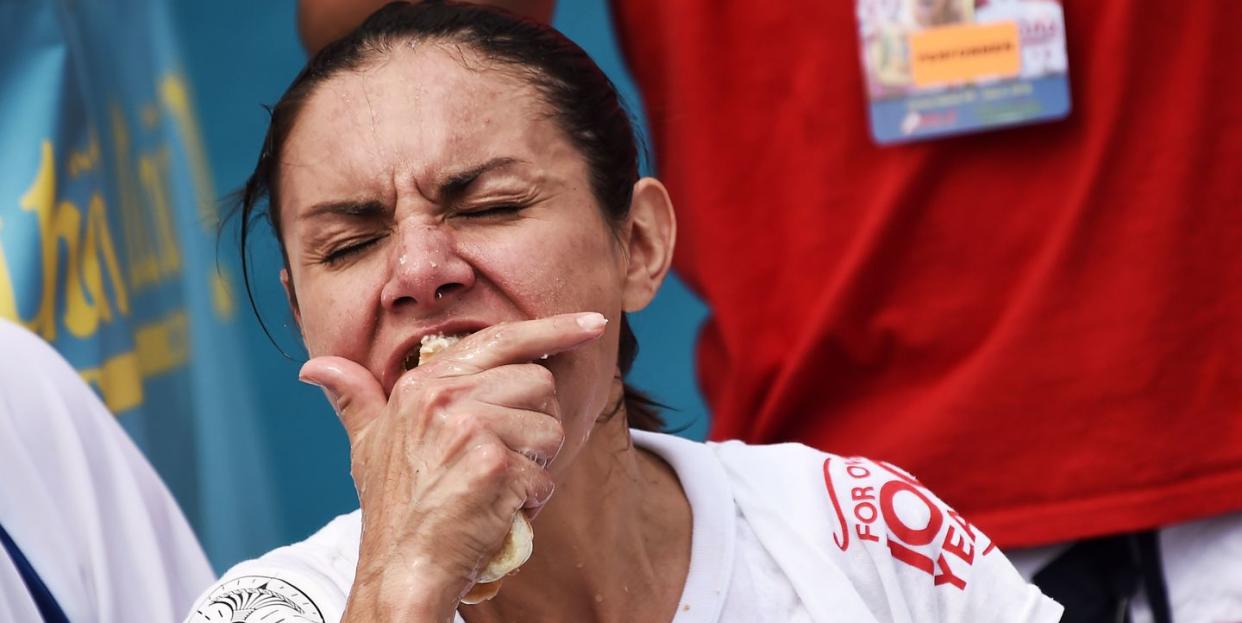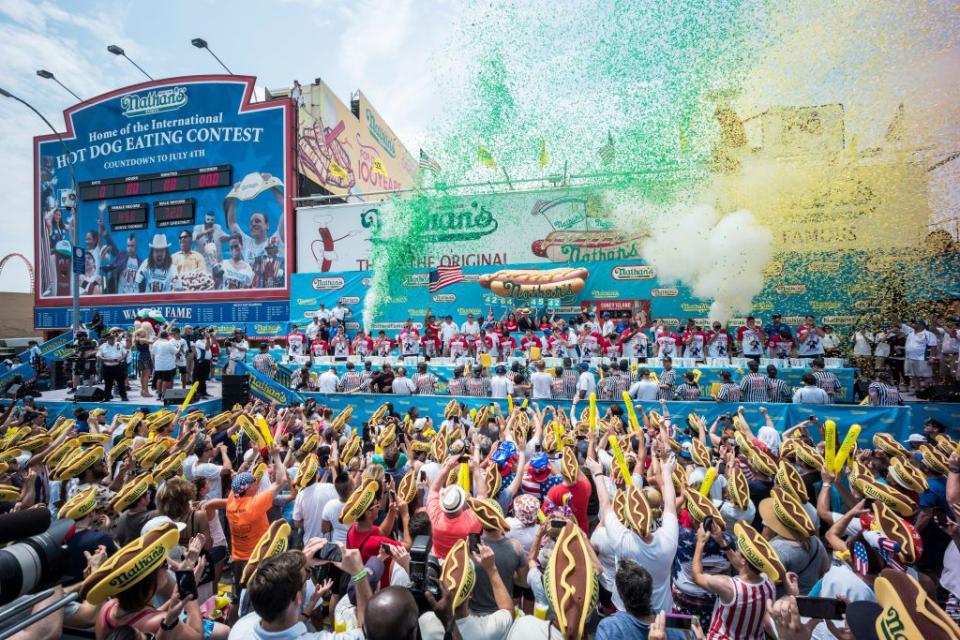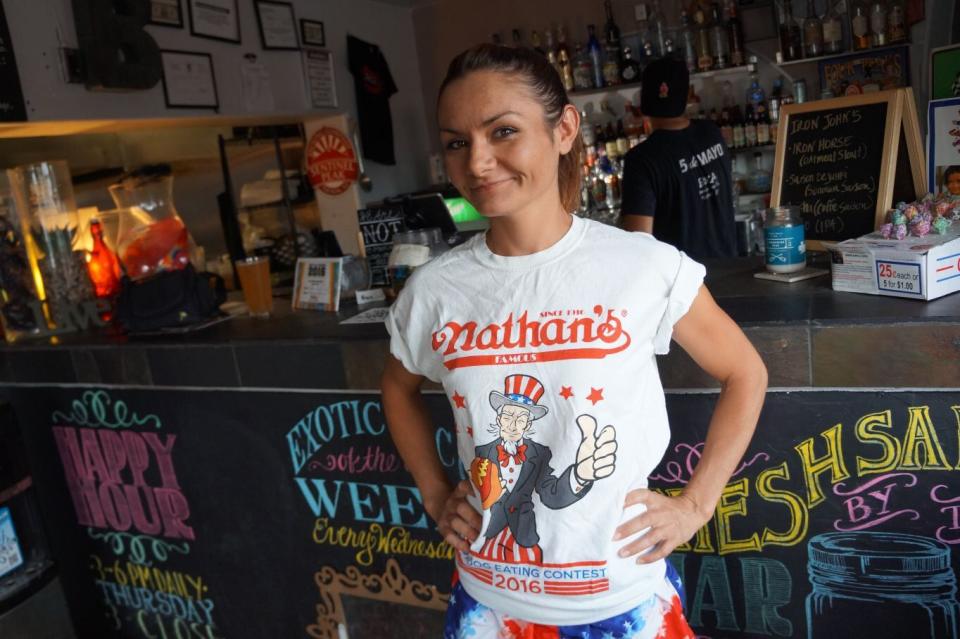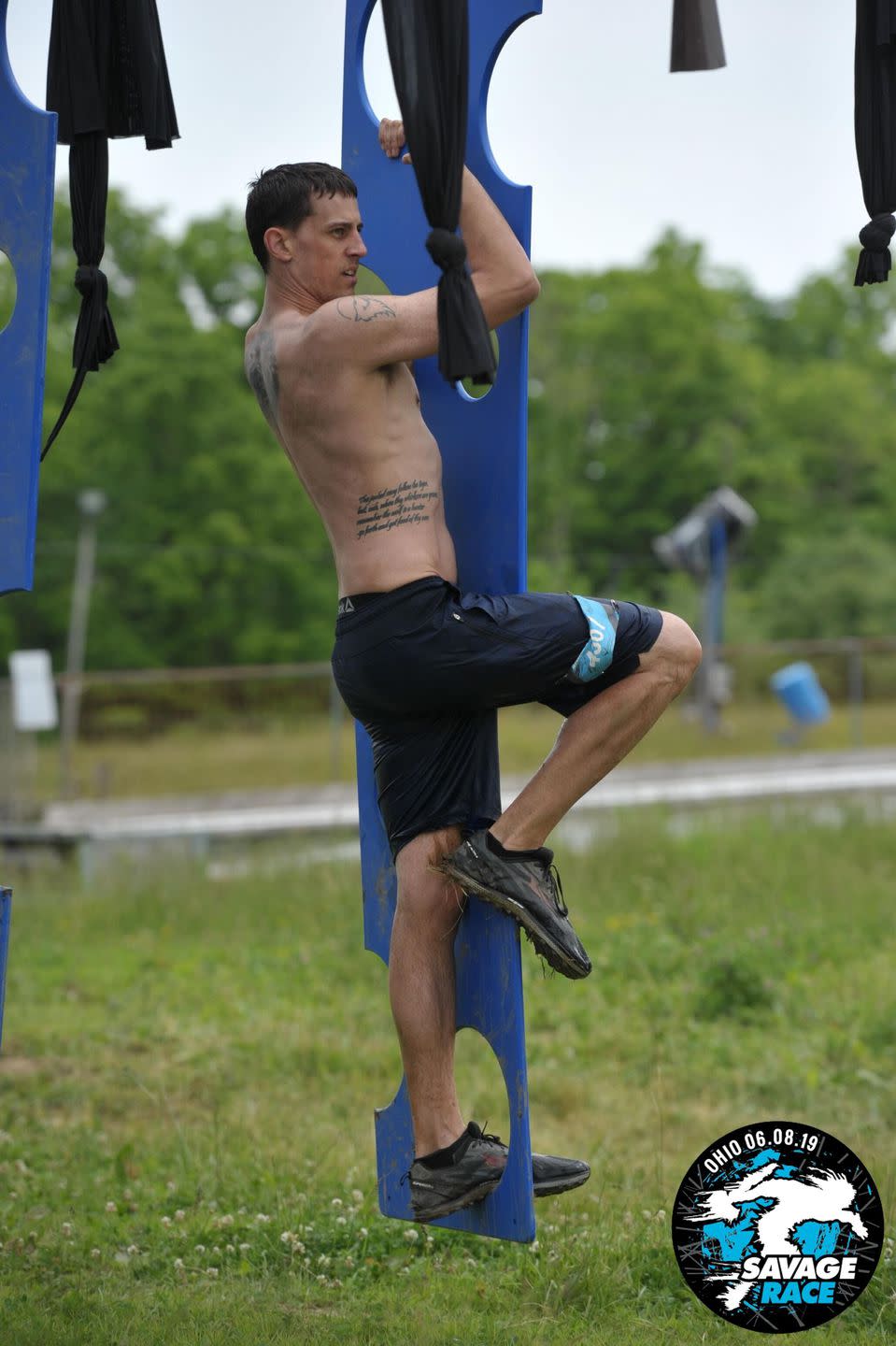What It's Really Like to Train for the Nathan's Hot Dog Eating Contest

Every July 4th, an elite crop of competitive eaters take the stage at Coney Island for a time-honored American tradition: seeing who can stuff the most hot dogs (plus bun!) down their throat in a 10-minute period.
Yes, we're talking about the Nathan's Hot Dog Eating Contest. The reigning men's champion, Joey Chestnut, ate 74 of 'em in 2018; the women's champ, Miki Sudo, ate 37. The battle is grueling-full of sodium, sweat, and tears-and so is the months-long training process.
In the lead-up to 2019's big event, we asked seven hopeful competitors to describe the Nathan's Hot Dog Eating Contest experience, from training their stomachs to hold inhuman amounts of food, to what happens when it all comes out the other end. (We invited them to be as graphic as they pleased.)
Here's who you'll hear from:
Derek Jacobs: ate 23 hot dogs + buns in 10 minutes to qualify for Nathan's
Geoffrey Esper: the 2017 and 2019 Hooters wing-eating champion
Matt Hazzard: ate 29.5 hot dogs + buns in 10 minutes to quality for Nathan's
Michelle Lesco: has scarfed down 25.5 hot dogs + buns at Nathan's
Nick Wehry: ate 34 hot dugs + buns in 10 minutes to qualify for Nathan's
Ronnie Hartman: once ate half a gallon of chili in a minute and 34 seconds
Sophia DeVita: ate 16.25 hot dugs + buns in 10 minutes to quality for Nathan's
And here's what they said about training for the 2019 Nathan's Hot Dog Eating Contest.

How many hot dogs would you estimate you've eaten during your training for Nathan's this year?
Jacobs: "At least 300."
Esper: "I'd say 600-800. Too many."
Hazzard: "By the time July 4th rolls around, I’ll have eaten over 1,200 hot dogs in preparation. I haven’t stopped training since last year’s contest, and it will be a key factor in my success at this year’s event."
Lesco: "By the time I hit the Nathan's stage at Coney Island, I have usually already eaten a few hundred hot dogs with my training. Each practice aligns with donations for Charity: Water, which builds wells for communities throughout the world that don't have access to clean water."
Wehry: "Hard to say to be honest, but in 2019 probably around 400 or so."
Hartman: "I would estimate I’ve eaten about 250 hot dogs in the last year training for Nathan's."
DeVita: "Estimated, I have probably consumed around 60-80 hotdogs for training this year."

Describe your training style. What does a day in the life of someone training for Nathan's look like?
Hazzard: "Competitive eating can be broken down into three fundamental components: eating speed, stomach capacity, and willpower. On a daily basis, I’ll train my stomach capacity by drinking large volumes of water (2+ gallons) in a very short period of time (~10 minutes). On a weekly basis, I’ll cook up a bunch of hot dogs and do a full 10-minute practice run. This helps to improve speed/technique and build the mental fortitude necessary to push through the proverbial ‘wall’ and continue to down more hot dogs when your body is screaming at you to stop."
Lesco: "Waking up and hitting the gym and eating lots of salads. On training days, waking up with some coffee and spending an hour setting up and cooking hot dogs to prepare for a 10 minute battle against myself, with the help of my training partner Miki Sudo. But there are also a lot of other contests leading up to the Fourth, so some days are dedicated to preparing for crawfish, oysters, donuts, wings, and anything else Major League Eating throws at me."
DeVita: "I typically try and keep my nutrition on point during the week so that I won’t feel too bad after a hot dog training session. I eat a lot of vegetables because they are low in calories and you can eat more of them to fill up your stomach. On top of that, I try to consume a lot of water with my meals."

How do you take care of your health while training? Do you work out?
Jacobs: "Yes, competitive eating is weird, but in essence is still just another physical activity that requires you to be in shape. A typical contest is 10 minutes long; try to do anything as fast as you possibly can for 10 minutes straight and see if you don’t get tired. Eating isn’t any different. I stay active by training for obstacle course races (Spartan, Savage, Tough Mudder) and do at least six of those a year. I also train Jiu-Jitsu, Judo, and MMA 3-4 times a week and do weightlifting 3 times a week."
Lesco: "We all work out. I do push-ups before bed and when I wake up. I do squats when I brush my teeth. I have a pull-up bar in my kitchen doorway. At the gym, though, I spend most of my time on the treadmill running."

Wehry: "I dabble in lifting. Coming from a bodybuilding background I try to maintain my 'leftovers' of my competitive physique. I'm usually in the gym 5 days per week, but little to no cardio. Other than competition and training days, my calories are counted virtually year-round as well to maintain health and body composition. Although I do enjoy the occasional ice cream or donut date with my kids."
Hartman: "I will eat in a calorie deficiency for about 2-3 weeks prior to a contest. I will lose about 3-5 lbs. prior to a contest just to 'make room' for the calories I’m going to take in for a contest. I work out 5-6 times a week. I also am a professional wrestler, and I train for that a few days a week."
DeVita: "I work out 4-6 days a week for about an hour or two. I also compete in Olympic weightlifting meets (snatch and clean and jerk) so those are the main lifts I am training while I work out. Outside of weight training, I make sure to keep my nutrition on point 80% of the time."

What do your friends, coworkers, and family think of your competitive-hot-dog-eating pursuits?
Esper: "Most people think it’s kind of neat. But some definitely don’t understand. I guess it’s an unusual thing to do, so a mixed reaction is to be expected. Mostly though, I don’t really care what others think."
Wehry: "Generally speaking, the family is concerned about your health. Friends and coworkers either think it’s disgusting or hilarious. However, although it's difficult, I try my best to not bring this aspect of my life home or to work."
Hartman: "My mother thinks it’s disgusting, and can’t actually watch me compete, but she loves to listen and cheer for me to win. She understands how important it is to me, and supports me, even if she can’t watch it. My fiancée is the complete opposite. She can stomach anything and she is the one always encouraging me to push harder. My friends think it's pretty rad and it comes up routinely in our discussions. I actually just started a job at New Era Cap about 3 weeks ago, and I feel like the entire building already knows I’m a competitive eater, it’s a great ice breaker lol."

What's the grossest thing that's happened to your body during training? Feel free to get as graphic as you want. We love talking about poop and other bodily functions here at Men's Health.
Esper: "I’ve never really had anything really gross happen. A couple of close calls, but I’ve always managed to get to a toilet on time. One time I drank a LOT of grape Kool-aid and my pee was purple for a little bit. That was a bit disturbing."
Hazzard: "Anything present in your colon will soon be forced out...if you catch my drift."
Lesco: "Probably almost shitting myself in the Walmart parking lot. I had taken some softeners to make sure I would be empty for a competition and apparently overshot how much was needed. So I was drinking some water outside my car in a Walmart parking lot and almost needed some wet naps. I managed to waddle to the McDonalds right near me and avoid any type of catastrophe. Close call though."
Hartman: "My first year I was very eager to compete, so I drove from Ft. Stewart, Georgia, to Radcliff, Kentucky, in order to compete in a hardboiled egg eating contest. It was about a 14-hour drive one way. Well, I had just enough time after the contest to get back to Ft. Stewart before I was due for PT in the morning at 6:30. I went on to eat 60 some hard-boiled eggs during the contest and got in my car right after the contest to drive back. Well, the entire drive back I had the worst gas a human could ever have. I had to drive the entire time back with all 4 windows down. My car smelled like fart for about 6 months after that contest, nothing I could do could do could get that smell out."
DeVita: "My first year, my body wasn’t used to the amount of sodium, fat, and carbs I was consuming in the contest, mainly because hot dogs are so processed. If it was a dessert contest my body would handle it better because I was doing food challenges on my YouTube channel (Sophia DeVita). That year I was bloated and didn’t poop for like a week or two, but my body finally adjusted with enough water, Pepto, and probiotics."
What's your routine the day before the competition? How do you prepare your body?
Jacbos: "No food day of, but lots and lots of caffeine. Helps get you amped up, but also helps clear out anything left in your system."
Hazzard: "About 36-40 hours before a competition, I will transition to an 'all-liquid' diet to ensure my digestive tract is as empty as possible to allow more room for stomach expansion. I drink protein shakes, Gatorade, and fruit juices. It’s important to make sure you’re still getting enough calories heading into the contest because eating as fast as possible for 10 minutes straight in hot, humid conditions requires a surprising amount of energy and is physically exhausting."
Wehry: "I personally cut out solid foods about 24 hours out. Just depend on Gatorade or essential amino acid drinks and electrolytes for energy. Push a bunch of fluid and make sure you 'empty out' so you have as much real estate to use as possible for the dogs. Then I'll get a light weight training session in really just to reset my mind and relax before the anxiety sets in."

Hartman: "The day before a contest I like to do a faster pace workout. I’ll rest like 30 seconds between sets, and like to get a good sweat on. During the day I will eat one meal that’s about 24 hours prior to my contest [and] that’s around 900-1,200 calories. I want to be empty for the contest, but I also need a few calories for energy."
Can you describe the feeling you get while competing? What makes this appealing?
Hazzard: "Before the contest, there are pre-game ‘jitters’ that most athletes experience regardless of sport. Once the countdown begins and the eating commences, there’s a huge surge of adrenaline and it’s off to the races. After you start getting full, but the elite can forge through until the end. It’s the same mentality of pushing through for that extra rep in the gym."
Lesco: "I still get nervous on contest days. The second the countdown gets to one, though, it's all about trying to stay focused. I don't meditate in daily life, but I imagine it is somewhat like that: being critically aware of specific muscles, knowing what they are doing and what you want them to be doing while adapting to game day conditions. It's a battle for 10 minutes-not only against the others at the table, but against all the doubts and excuses your mind tries to throw at you to get you to give up. The appealing part is knowing it is possible to win both battles."
DeVita: "Before the contest I typically get butterflies. It is the same feeling I would get before high school track meets or my college soccer matches. During the first five minutes I am excited and going as fast as possible, with the crowd cheering myself and other eaters to eat as many wieners as possible. The last five minutes are the worst. I feel my stomach getting full, the hot dogs aren’t tasting as good, the sodium is overwhelming my tastebuds. In the last minute I try to swallow everything to have an empty mouth. With the last 10 second I do my best to fit a whole hot dog and bun in my mouth. This is what’s called 'chipmunk.' After the contest I review what I have consumed and hope I did better than my last contest."
At what point do the hot dogs stop tasting good? (Do you even like hot dogs?)
Jacobs: "About 7 min in. If you are eating cheap dogs it can be much sooner, but Nathan’s franks really are good."
Esper: "I don’t eat hot dogs as part of my normal diet. But obviously, I eat lots of them practicing. I never get sick oft hem. Actually, after Coney, I miss practicing with them. I’m lucky, I hardly ever get sick of eating foods. I can and sometime do eat the same food every day for weeks on end. I’ve been that way my entire life."
Hazzard: "I’ll typically get tired of the taste after about 15 hot dogs, and then start dunking the buns in cherry Kool-Aid and raspberry lemonade to switch it up. Ironically, I now enjoy hot dogs more after eating them all of the time, and I’ve grown especially fond of the distinct Nathan’s Famous flavor."
Lesco: "If you're doing it right, you're not super focused on the taste of the food, but you do notice. Luckily Nathan’s Famous hotdogs are a quality dog, so it takes longer for the flavor fatigue to set in. I would say around the 6-8 minute mark for me, things get rough. To be honest, now when I see hot dogs, they mean more business than enjoyment."
Wehry: "I LOVE Nathan's Famous hot dogs. If I am at a BBQ with generic hot dogs, there is no way I would ever get one, but I honestly could eat a Nathan's Famous hot dog on any day of the year. The next day, I even eat the leftovers from my training runs. That said, I probably only really enjoy them until the 25th hot dog."
Hartman: "I love hot dogs, growing up my two favorite foods were chicken wings and hot dogs. I’d say the first 15 are enjoyable. Anything after that is work."

What happens to your body after the competition? Again, feel free to get as graphic as you want.
Jacobs: "Beyond the obvious full feeling, immediately after you can feel very winded if you haven’t been able to time your breathing and eating together. Very salty foods will make you incredibly thirsty."
Esper: "Usually I feel OK, depending on the food. I get really hot a couple of hours afterward and have lots of energy. Also, I get really thirsty. It’s really not a fun time. Some foods are much harder than others. I think the worst food of all though is chili. Chili does not stay with me very long after the contest. But I really don’t care for chili to begin with."
Hazzard: "If you were successful during the competition and able to fill up to 85% or more of your stomach capacity, it’s not a matter of if, it’s a matter of when. The prudent choose to do so sooner rather than later."
Lesco: "Hot dogs have a lot of sodium, so post-contest, you get really thirsty. If I have eaten to capacity, it's usually a game of waiting for some good burps to make room for more water to rehydrate. The weirdest moment was that one year, all the hot dogs kind of sat on my bladder and for about 2 hours. I felt like I desperately had to pee. I imagine it's similar to what pregnant women go through when the baby shifts over their bladders."
Hartman: "... Everyone wants to ask the poop question, so I’ll answer it for you. I’m normally backed up for 1-2 days after the contest. The third day after the contest, it’s like a constant mudslide throughout the day. I’ll let you figure that out..."
('You Might Also Like',)

